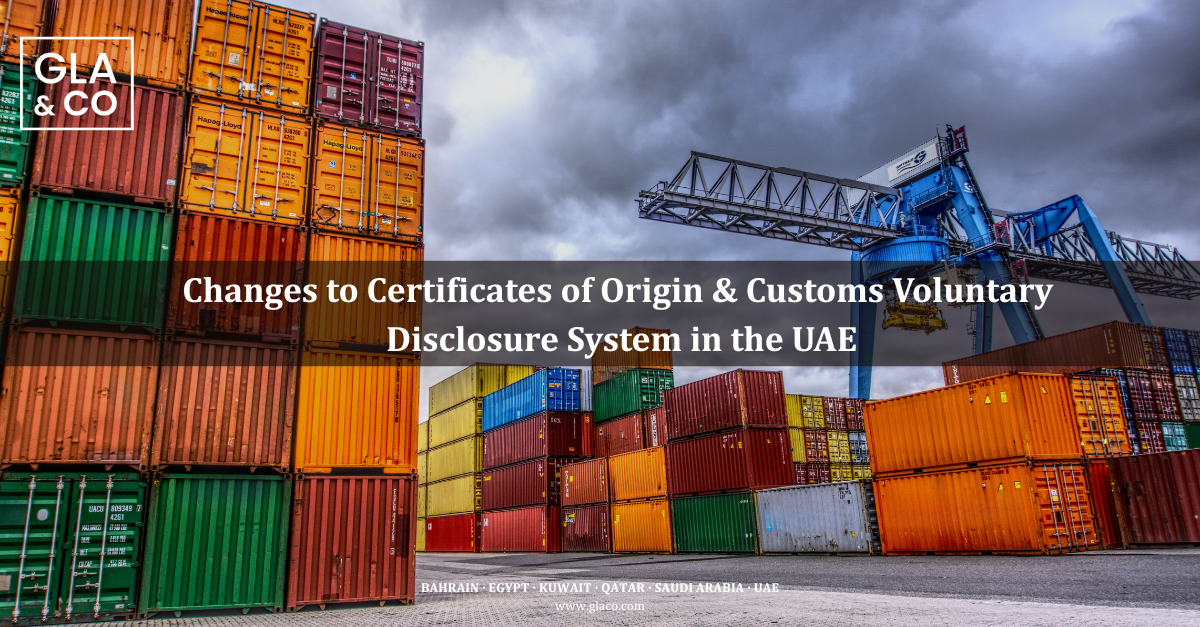
Changes to Certificates of Origin & Customs Voluntary Disclosure System in the UAE
INTRODUCTION
Determining the correct country of origin for imported goods is a critical aspect of customs compliance in the UAE. Misclassification or incorrect documentation can lead to legal and financial consequences for importers. This article examines the legal framework governing Certificates of Origin (“COO”) in the UAE, the implications of incorrect origin declarations, and the potential penalties for non-compliance.
LEGAL FRAMEWORK FOR DETERMINING COUNTRY OF ORIGIN
Under UAE Federal Law No. 11 of 2019 on the Rules and Certificates of Origin (the “Certificates of Origin Law“) and its Executive Regulations (issued per UAE Cabinet Decision No. 43 of 2022), the origin of imported goods is determined based on where the last substantial transformation occurred.
If a product is wholly obtained in one country, that country is considered the origin. However, if processing occurs in multiple countries, the origin is the country where the final substantial manufacturing or processing took place, meaning a transformation that results in a new product or a significant stage of manufacture. Simple operations such as packaging, labeling, or minor processing do not confer origin.
CRITERIA FOR SUBSTANTIAL TRANSFORMATION
Per the provisions of Article 3 of the Certificates of Origin Law, and further clarified under the Executive Regulations, the key criteria for substantial transformation include the following occurrences:
- A product is considered to have undergone substantial transformation in the country where it has been wholly processed, produced, or manufactured, provided that the operation is sufficient and exceeds mere preservation or preparation for shipment.
- The last major operation or processing must:
- be economically justified;
- be carried out in a facility equipped for such processing; and
- result in the creation of a new product or represent a significant stage of manufacture—such as a change in the customs tariff heading or completion of specific manufacturing processes.
IMPLICATIONS OF INCORRECT CERTIFICATES OF ORIGIN
- Customs Duty Obligations
Under Federal Law No. 19 of 2002 (“Customs Duty Law”), the UAE imposes a standard 5% duty on most goods imported from outside the GCC Customs Union. If goods were incorrectly declared (e.g., wrong country of origin), but no preferential rate was claimed, the duty remains 5% (assuming no trade agreement applies). However, if a preferential rate was incorrectly claimed, customs may retroactively assess the correct duty (5%) and revoke the preferential treatment.
- Penalties for Incorrect Declarations
Criminal Penalties: Falsifying origin details to gain customs benefits may lead to temporary imprisonment and/or fines between AED 100,000 and AED 500,000 (doubled for repeat offenses).
Administrative Penalties: The Ministry of Economy may impose an official warning, temporary suspension (up to one year) from receiving certificates of origin, or even permanent suspension.
Customs Fines: Dubai Customs may impose AED 500 per incorrect declaration for misstatements in origin.
CUSTOMS VOLUNTARY DISCLOSURE SYSTEM
While severe penalties exist for fraudulent intent, penalties may be reduced if the error was unintentional and properly disclosed. Under Customs Policy No. 58 of 2024 (“Voluntary Disclosure System” or “VDS“), importers must promptly disclose errors in past customs declarations before discovery by authorities. Disclosures should be submitted electronically via Dubai Customs/Dubai Trade systems, with supporting documents.
CONCLUSION
Ensuring accurate COO is crucial for UAE importers. Misclassification can lead to customs duties, fines, and legal repercussions, but voluntary disclosure may mitigate penalties. Businesses should verify origin rules under UAE law, maintain proper documentation, and use the Voluntary Disclosure System if errors are identified.
Authors: Suzanne Hashem, Legal Director, Khaled Abu Orabi, Senior Associate, Khaled Al Khashab, Associate.

